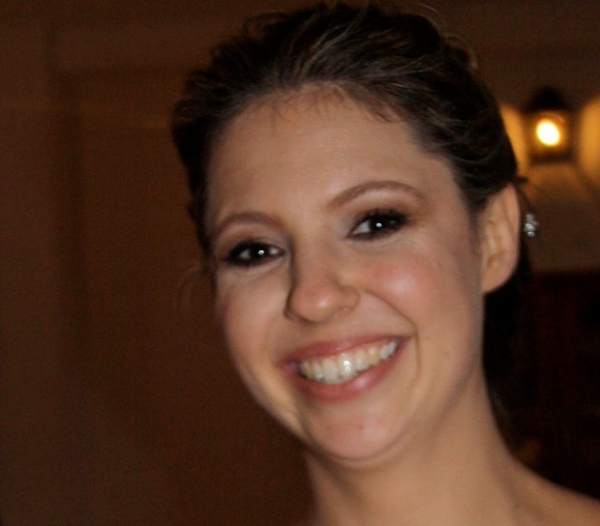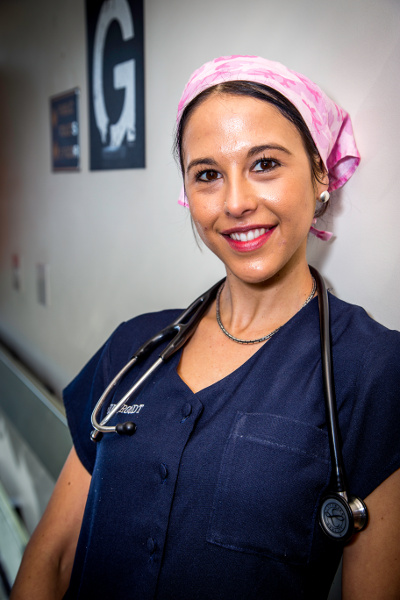Innovations at Groote Schuur offer hope to patients and nurses

A year after receiving a kidney transplant, Vuyo [not his real name] travelled to the Eastern Cape to visit his grandmother. A young man of 19, Vuyo had been making good progress after the operation, but he still had to take medication daily.
When his bag, containing his clothes and medication, was stolen, he went to the local hospital, where a junior doctor told him, “If you’re Groote Schuur’s patient, you can just get your medication when you go back.”
But Vuyo felt traumatised by the incident, and was too embarrassed to return to the hospital when he got back. It was only when he fell ill and was forced to visit Groote Schuur, that the truth emerged – that he had gone several weeks without his life-saving medication.
“When we questioned him on it he said he knew it was wrong,” says Dr. Bianca Jane Davidson, a fellow of surgery at the Nephrology unit of Groote Schuur. “He just didn’t know what to do.”
This, and several other similar incidents, led Davidson to realise that teenagers and young adults, who undergo kidney transplant surgery, need additional help and guidance in dealing with the ramifications of the condition. “It just made me realise that we’re not equipping our patients with the right life skills to make the most of the opportunity of getting a new kidney,” says Davidson.
Davidson approached the Groote Schuur Innovation Programme to come up with an alternative programme for adolescents in the nephrology [kidney] unit. The Innovation Programme — the first of its kind locally — is being pioneered by Groote Schuur in tandem with the Bertha Centre for Social Innovation and Entrepreneurship at the University of Cape Town (UCT) Graduate School of Business, and UCT’s Faculty of Health Sciences. The thinking is that there’s no-one better placed to bring about creative innovation in the hospital than the nurses, doctors, cleaners, administrators and other healthcare professionals who work there.
Nephrology patients under the age of 12 are treated separately, at the Red Cross Children’s Hospital, and sometimes they continue there, if the case warrants it. But once they leave, or if they are older than 12 when diagnosed, they are blended into the same facility as adults, and herein lies the challenge for Davidson and her team.
The problems these adolescents and young adults experience are unique and manifold. “One girl said she didn’t wear a short-sleeved shirt for close to a year, because she was so embarrassed about the dialysis line that was in her arm,” explains Davidson. “Things like body image and the self-consciousness that’s coming out of it — there are aspects of this that I didn’t realise.”
Davidson did further research on adolescents and came up with some interesting facts. “You are only able to think ‘like an adult’ at the age of 25,” says Davidson, citing recent neurological research. “The part of your brain that is involved in emotion and enjoyment — the emotion-driven behaviour — develops a lot quicker and rapidly than the frontal lobe, which is involved in planning, execution and consequences. So you are actually hardwired to instant gratification and short-term reward when you are younger. And you’re only able to think properly through the consequences of your actions by 25,” explains Davidson.
Originally Davidson wanted simply to create a separate facility for the under-25 group of patients. But in her consultation with the Bertha Centre’s Health Initiative team, the programme has expanded. “They came to me and said, instead of just a preconceived idea of what we think that young people want, why don’t we let them design the service themselves? So that whatever we put money behind, we are 100% sure that they are going to want.”
Davidson says that this will be the first time in Africa that young people are going to design a service for themselves. “We’re going through a process of three or four focus groups. It’s going to be quite comprehensive, involving staff and young people and parents; and we’re going to sit down to define not only a problem list, but then come up with prioritising the problem list based on what young people with chronic kidney disease are struggling with.”
Four previous patients, ranging in age from 18 to 26, who have been through the ‘old’ service, and have first-hand knowledge of the issues, are assisting with the research. Davidson explains: “All of them want to give something back and they’re quite passionate about the project, so at the moment they are interviewing other younger patients, and they’re finding out what the problems are, that these patients are facing, and what their ideal service would look like?”
The new service will use the same facilities, but it will be time-defined. Every second Thursday, only under-25 dialysis, transplant and general nephrology patients will be treated. Normally these adolescents would arrive at noon to have their blood tests taken, and then sit with their parents until 2:00 pm, waiting for the doctor. In the new service, that time will be used for having a light meal followed by a group session, run by the psychologist and patient mentors. Here they will be able to bring up and address issues that they are struggling with. “That’s quite new,” says Davidson, “and one of the things that all the patients say, is that peer support is the most important part of getting through any challenge in life.”
After the group session, the clinic will run as normal for the adolescent patients. But there is more in the pipeline, depending on the feedback from these patients. One idea is to run occasional seminars or educational sessions in the group therapy slot, sometimes with parents and sometimes without, to address specific life skills; for example, writing up a CV, how to go to a job interview, how to deal with conflict. Davidson insists, however, that this will be dictated by what the young people want to learn about. “I don’t know yet what the structure of that is going to be, but that’s what we’re going to see with the focus groups. So the focus groups are really the planning for the ultimate clinic.”
Of course, Groote Schuur is a public facility, and funds are limited, so any additional costs have to come from somewhere. Davidson has spent the past year fundraising, to pay for the social worker and psychologist. “What I’ve found from the fundraising side is that people are quite interested in donating to something that makes a difference. So we’ve managed to raise R31,000 so far, which I’m really proud of.”
Another initiative that is being promoted through the Groote Schuur Innovation Programme is called ‘Dare to Care,’ spearheaded by Groote Schuur’s surgical registrar, Dr Liana Roodt.
Nurses are very much in the ‘frontline’ of medical care, dealing with people at their most vulnerable and traumatised, executing precisely the care instructions given by doctors, and, for those working in ER and trauma wards, dealing with horrifying scenes of violence.

Dr Liana Roodt worked with Dr Lydia Cairncross to reduce waiting time for breast-cancer surgery from several months to two weeks. Photo by Bev Muldrum.
“As an institution I think we have a responsibility to invest in these people and try and give back,” says Roodt, “and give them the tools to cope with all these things that they deal with on a daily basis.”
Previously Roodt launched an initiative, in conjunction with Dr Lydia Cairncross, the consultant surgeon at the hospital, to overcome a chronic surgical backlog. By using ‘down-time’ in theatres, this project was able to cut the waiting time for patients needing breast-cancer surgery from several months to two weeks. Known as Project Flamingo, the initiative also created group consultations for newly-diagnosed cancer patients, where ‘pamper packs’ are distributed.
Roodt aims to get an international coach to consult with the nurses, at least in the initial stages. She believes that someone with a different mindset could make a valuable contribution. “If you bring in an outsider, somebody with fresh eyes and fresh ideas, you expand the possibilities,” says Roodt, adding: “So I think we can learn world class things from this expert and, at the same time, have the opportunity to share what we learn in an African context with the rest of the world.”
Historically, coaching is done with small groups of people, which results in many people being excluded, so Roodt has come up with a solution that is designed to be as inclusive as possible. Groote Schuur’s staff complement is over 3,600, so Roodt proposes using short video tutorials shown at a time when the staff normally comes together. Roodt observes: “A lot of hospital work is structured around daily meetings—handovers—so there’s a lot of opportunity where ward staff and clerks and everybody gets together and talks.”
Every two weeks, a video will be shown followed by a group discussion. Roodt explains: “The videos will be structured around a theme. For instance ‘burnout’ is something a lot of staff complain about, and we will give them some information about how to cope with it, how to recognise it and then ask three key questions that they can discuss with each other. And then at the end of the 20 weeks they’ll have a closing seminar or a debriefing seminar, where the staff can bring questions or what they learned or experienced during this time, and discuss it with the coach who’s developing the series.”
The programme will go through a pilot phase with a small group of wards and theatre staff, which will include pre- and post-coaching assessments, to assess what effect the programme is having, before being developed further and rolled out to all the wards.
“In terms of scalability and accessibility I think it’s completely unique and certainly hasn’t been done anywhere else in South Africa that I’m aware of, or that’s available in the literature,” says Roodt.
The fact that these programmes all require additional time and input from the hospital’s medical professionals, is testament to the dedication of those who have become involved in the Innovation Programme. Perhaps it’s best summed up by Davidson, who says: “I wouldn’t have taken it on unless it’s something I feel quite passionately about. It doesn’t feel like a chore to me… So yes, it’s a lot of work, but… seeing young patients grow and reach their potential is really rewarding. As I was saying to a friend the other day, ‘Every time I feel overwhelmed, another door or avenue opens and something goes right, and it feels like a path that I’m meant to be on.’”
Next: Hope and hatred in South Africa: an interview with Jonny Steinberg
Previous: Treachery and the quest for truth: review of Jacob Dlamini’s Askari

This article is licensed under a Creative Commons Attribution-NoDerivatives 4.0 International License.


